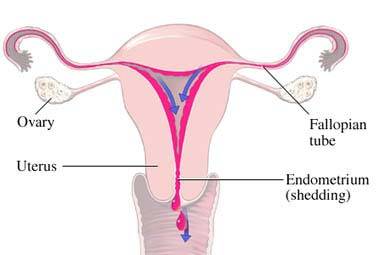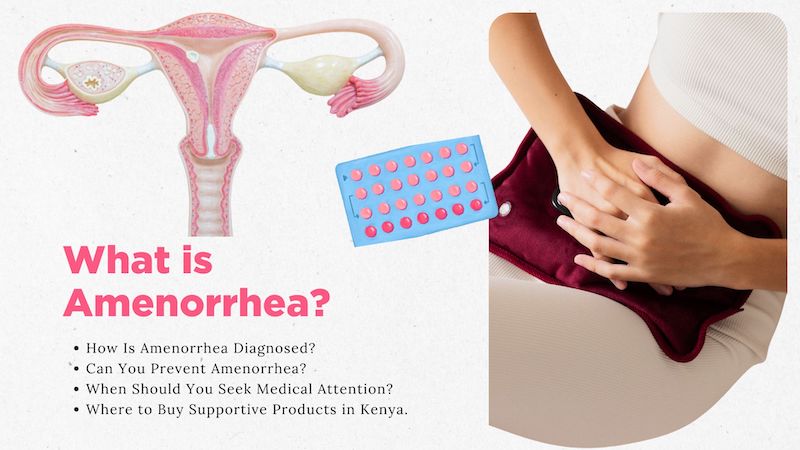


Date: 11 Aug 2025
Amenorrhea is the medical term for the absence of menstrual periods in women of reproductive age. While it’s normal to miss your period during pregnancy, breastfeeding, or menopause, missing your period outside these stages could indicate an underlying health concern.
There are two main types of amenorrhea:
Understanding amenorrhea means listening to your body; it’s often a sign that something deeper needs attention.

Diagnosing amenorrhea involves investigating the underlying reason why menstruation has stopped. Doctors begin by ruling out pregnancy, which is the most common cause of missed periods. A pregnancy test is the first and simplest step.
Next, a thorough medical history and physical exam are done. The doctor will ask about your menstrual history, lifestyle habits, weight changes, stress levels, and any recent illnesses that you have experienced. This helps pinpoint whether the cause is hormonal, structural, or behavioral.
Blood tests are often ordered to evaluate hormone levels, including FSH (follicle-stimulating hormone), LH (luteinizing hormone), estrogen, prolactin, thyroid hormones (TSH), and testosterone. These tests reveal whether the issue is linked to the ovaries, pituitary gland, or thyroid.
In some cases, imaging tests like pelvic ultrasound or MRI may be needed to check for anatomical abnormalities such as ovarian cysts, fibroids, or uterine scarring. If structural issues are suspected, a pelvic exam and even laparoscopy might follow.
Amenorrhea treatment depends on the underlying cause. It may involve lifestyle changes, medication, hormone therapy, or supportive care. Here’s a breakdown of the key treatment options:
For women with amenorrhea caused by extreme dieting, weight loss, or excessive exercise, restoring balance through a healthy diet and reduced physical stress is the first step.
Gaining weight to a healthy range, reducing high-intensity workouts, and ensuring enough calories can help restart natural hormonal rhythms.
Stress management techniques like yoga or therapy can also play a powerful role.
When hormone imbalance is the culprit, such as low estrogen, PCOS, or thyroid disorders, medical treatment typically includes hormone replacement therapy or birth control pills. These therapies help regulate or restart the menstrual cycle and protect against bone loss.
Thyroid medications are prescribed if hypothyroidism is diagnosed, and prolactin-lowering drugs may be used if elevated prolactin levels are interfering with ovulation.
For women experiencing amenorrhea due to conditions like PCOS or hypothalamic dysfunction and who wish to conceive, medications such as clomiphene citrate or letrozole are used to induce ovulation.
These treatments are closely monitored and often paired with lifestyle improvements for optimal results.
In rare cases, surgery may be necessary to correct physical causes of amenorrhea. This can include the removal of uterine adhesions (Asherman’s syndrome), treatment of congenital abnormalities, or removal of pituitary tumors.
Surgery is often a last resort when non-invasive methods haven’t worked.
For women with amenorrhea caused by low estrogen levels, the long-term risk of osteoporosis is a concern. Calcium and vitamin D supplements are recommended to maintain bone density and prevent fractures.
This is especially important in cases of functional hypothalamic amenorrhea or early menopause.
Yes, many cases of secondary amenorrhea are preventable. Maintaining a healthy body weight, avoiding overtraining, eating enough calories, and managing stress can go a long way in keeping hormones balanced.
Young women, especially, should avoid extreme dieting and overexercising during their developmental years. Regular check-ups, hormone screening, and menstrual tracking apps can help detect changes early and prompt treatment before complications arise.
You should speak to a doctor if:
The earlier the cause is identified, the better the chances of restoring your cycle and preventing long-term issues like infertility or bone weakening.
Alongside medical treatment and lifestyle changes, natural supplements can support hormonal function, bone health, and overall wellness. Here are carefully selected products from Pharmily Kenya to help support recovery from amenorrhea:
This effervescent supplement provides both calcium and vitamin C. It helps maintain bone strength, especially when menstruation is absent due to low estrogen. It also boosts immunity and improves fatigue levels that often accompany hormonal shifts.
A high-potency combination designed for maximum absorption. It’s perfect for women dealing with hormone-related bone loss or those in recovery from hypothalamic amenorrhea or early menopause.
This herbal remedy supports menstrual regularity and hormonal harmony. It's especially beneficial for women with mild to moderate cycle irregularities due to stress or nutritional imbalances. It also helps boost energy and reproductive health.
Amenorrhea can be unsettling, but it’s also a call to pause and listen to your body. Whether the reason is stress, a hormonal imbalance, lifestyle factors, or a deeper medical issue, there is hope and help.
With the right blend of medical care, natural support, and a compassionate approach to your body’s needs, balance can be restored.
Products from Pharmily Kenya, like M2-Tone and calcium with vitamin D3, offer reliable wellness support as part of a broader healing journey.